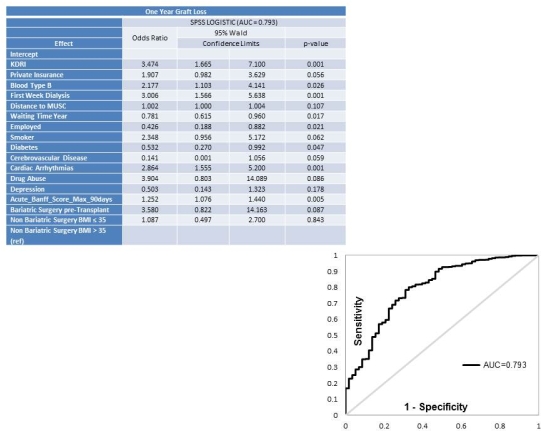Pre-Transplant Bariatric Surgery and One-Year Graft Loss Risk in Kidney Transplants.
G. Mour, J. Zhang, Z. Su, D. Taber, P. Mauldin, T. Srinivas.
MUSC, Charleston.
Meeting: 2016 American Transplant Congress
Abstract number: 344
Keywords: Kidney transplantation, Metabolic complications, Obesity, Post-operative complications
Session Information
Session Name: Concurrent Session: Metabolic Complications in Kidney Transplantation
Session Type: Concurrent Session
Date: Monday, June 13, 2016
Session Time: 4:30pm-6:00pm
 Presentation Time: 5:30pm-5:42pm
Presentation Time: 5:30pm-5:42pm
Location: Room 312
Background: Several centers recommend bariatric surgery (BS) pre-transplantation (pre-Tx) with arbitrary BMI cutoffs. The effects of BS on Tx outcome are unclear. We studied the effects of BS on 1 yr graft loss (GL).
Methods: Through a quality improvement initiative, we built a predictive risk model to assess associations between pre-Tx BS and 1-yr GL. Both structured and unstructured data were used. We included adult solitary kidney transplant recipients transplanted between 2007 and 2015. We excluded patients without a recorded BMI at tx., Detailed structured data were directly applied from electronic medical records and Natural Language Processing (IBM Watson) was applied to unstructured text to extract Banff scores. We examined : 1) patients with BS prior to transplant, 2) patients with BMI ≤ 35 who did not have bariatric surgery 3) patients with BMI >35 who did not have BS (reference group). IBM SPSS Modeler and Essentials for R were used for analysis.
Results: Of 1167 patients, 5.0% experienced one-year GL. 31 patients received BS pre-Tx, 974 patients with BMI ≤ 35 who did not have BS, and 162 patients with BMI >35 who did not have BS (reference group). Patients with BS pre-Tx trended 3.58 times more likely to have 1-year GL than our reference group of those patients with BMI >35 who did not have bariatric surgery (p=0.087). Other variables significantly associated with increased one-year GL included KDRI, blood type B, DGF, cardiac arrhythmias, and maximum Acute Banff lesion scores over 1st 90 days post-Tx. Variables significantly associated with lower 1-yr GL included waiting time, being employed, and diabetes. The predictive model AUC was 0.79 (95% CI: 0.73-0.86), suggesting formidable model accuracy.
Conclusion: Patients with bariatric surgery have increased GL as compared to patients with BMI > 35. The causes could be decreased CNI/MMF absorption due to the surgery itself or increased oxalate absorption leading to crystallization in the transplanted kidneys. Our findings question the advantages of bariatric surgery in patients with high BMI especially among centers having a BMI cut off criteria for transplantation. Further studies involving larger numbers of such patients should be considered.
CITATION INFORMATION: Mour G, Zhang J, Su Z, Taber D, Mauldin P, Srinivas T. Pre-Transplant Bariatric Surgery and One-Year Graft Loss Risk in Kidney Transplants. Am J Transplant. 2016;16 (suppl 3).
To cite this abstract in AMA style:
Mour G, Zhang J, Su Z, Taber D, Mauldin P, Srinivas T. Pre-Transplant Bariatric Surgery and One-Year Graft Loss Risk in Kidney Transplants. [abstract]. Am J Transplant. 2016; 16 (suppl 3). https://atcmeetingabstracts.com/abstract/pre-transplant-bariatric-surgery-and-one-year-graft-loss-risk-in-kidney-transplants/. Accessed February 14, 2026.« Back to 2016 American Transplant Congress
